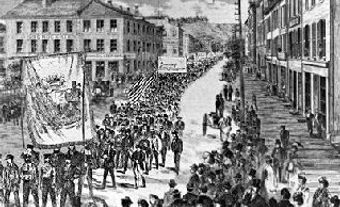David Fennario (David William Wiper), playwright, political candidate (born on 26 April 1947 in Montreal; died 16 September 2023). Focusing on working-class themes, his most notable piece is Balconville ― Canada’s first bilingual play.
Early Life and Career
David Fennario grew up in Verdun, Pointe-Saint-Charles and Little Burgundy ― anglophone working-class areas of southeast Montreal. He drifted through a series of dead-end jobs until he enrolled in Montreal's Dawson College. There, a teacher, Sally Nelson, arranged a private publication of his journal entries about life in these working-class neighbourhoods; this eventually became Without a Parachute (1972). The book caught the attention of Maurice Podbrey, artistic director of the Centaur Theatre. Podbrey encouraged Fennario to write plays and subsequently appointed him the theatre's first playwright-in-residence.
Balconville and Other Works
Maurice Podbrey premiered David Fennario’s On the Job (1975), which was an overnight success, Nothing to Lose (1976), Toronto (1978), Balconville (1979), Moving (1983), The Murder of Susan Parr (1989) and The Death of René Lévesque (1991). Although both On the Job and Balconville won Chalmers awards (for best Canadian play), it was the latter that established Fennario's reputation as one of Canada's most talented and respected playwrights. About one-third of Balconville’s dialogue was in French. Balconville was billed as Canada's first bilingual play and the first to describe the language tensions between anglophones and francophones. (See also Allophone.) Notably, the separatist Parti Québécois had recently been elected. Balconville played across several Canadian cities. It was produced in London's Old Vic theatre, had a run in Belfast, Northern Ireland and was broadcasted on CBC-TV in 1985. (See CBC/Radio-Canada.)
Did you know?
In 1980, when Balconville had a run at Montreal’s Place des Arts, Fennario famously picketed his own play alongside striking theatre ushers. (See also Music at Place des Arts.)
Style and Approach
David Fennario set his early naturalistic dramas in grimy factories, smoky taverns or decaying tenements. He realistically depicted ordinary labourers who struggled against the economic imbalance that existed between management and workers.
Later on, Fennario focused on community theatre groups like Playwrights Workshop Montreal or the Black Rock Theatre which Fennario helped create. Among these creations, Banana Boots (1988) was a one-man show that he wrote and performed.
Increasingly concerned that the conventional, mainstream style of his plays was attracting a middle-class audience and not reflecting working-class subject matters, David Fennario turned to writing plays influenced by Bertolt Brecht, agitprop (politically activist theatre) and cabaret. Joe Beef (1984), a history play about "The Pointe" and the first to adopt this new form, won the Prix Pauline-Julien.
Later Life
After a lengthy absence from the Centaur Theatre, David Fennario was commissioned to write a sequel to Balconville. Produced in 2005, Condoville revisits the characters and setting. Although the confrontations over language assume less importance, the inhabitants ― now a more complex group of gay people and mixed-race couples ― continue to be oppressed by disenfranchisement and poverty; they are no longer able to afford their increasingly affluent neighbourhood, which is being gentrified by the quick rise of condominiums.
In 2002, David Fennario was diagnosed with Guillain-Barré syndrome, a nerve disorder that forced him to use a wheelchair. He was also unable to write or type by himself. Nevertheless, he ran for political office in 2003 for the Union des forces progressistes party. That same year, he wrote Skeleton Staff. In 2007, he ran for Québec solidaire.
Fennario continued to write plays, his last pieces include Bolsheviki (2010) and Motherhouse (2014).

 Share on Facebook
Share on Facebook Share on X
Share on X Share by Email
Share by Email Share on Google Classroom
Share on Google Classroom

